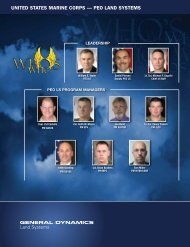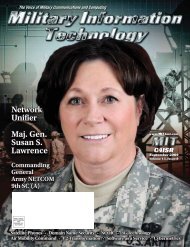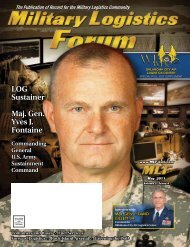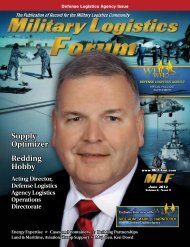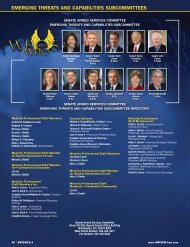Theater Logistician Maj. Gen. Kenneth S. Dowd - KMI Media Group
Theater Logistician Maj. Gen. Kenneth S. Dowd - KMI Media Group
Theater Logistician Maj. Gen. Kenneth S. Dowd - KMI Media Group
You also want an ePaper? Increase the reach of your titles
YUMPU automatically turns print PDFs into web optimized ePapers that Google loves.
The new task orders are the continuation of the Army’s plan<br />
to transition work from the single-source LOGCAP III contract<br />
to the multiple-award LOGCAP IV contract.<br />
So far, there have been 10 task orders awarded under LOG-<br />
CAP IV, Loehrl said.<br />
The task orders encompass base life support services and<br />
logistics support, which include base setup, food service, facilities<br />
maintenance, and morale, welfare and recreation to name<br />
a few, Loehrl said.<br />
The Army had previously transitioned all LOGCAP work<br />
in Kuwait from LOGCAP III to LOGCAP IV (DynCorp), as well<br />
as awarded some new work in Afghanistan under LOGCAP IV<br />
(Fluor and DynCorp).<br />
These newly announced task orders will transition all work<br />
in Afghanistan to LOGCAP IV. Similar processes to compete and<br />
transition the work in Iraq are also under way.<br />
“The transition will be operationally driven, and methodically<br />
undertaken to ensure a transition that is seamless to the<br />
warfighter,” Hayden added.<br />
“The transition is not a ‘turnkey’ operation and is extremely<br />
complex,” Thompson said. “Before we even begin the legacy<br />
task order transitions, we will be starting the urgent work<br />
required for force expansion [in Afghanistan].”<br />
The first step in the process is to conduct a post-award conference<br />
scheduled in early August, Thompson said. The conferees<br />
will discuss such areas as transition touch-points, explain<br />
the process, and reach agreements between contractors on the<br />
conduct of the transition, known as protocols, Thompson said.<br />
“During the transition the incumbent continues to provide<br />
services and will do so until the U.S. government is satisfied<br />
that the incoming performance contractor [IPC] can assume<br />
full operation of the function,” Thompson explained. “Once the<br />
IPC has demonstrated full operational capability, the incumbent<br />
is officially released from responsibility and the IPC is<br />
officially assigned full responsibility and accountability for<br />
performance execution.”<br />
Reviews, audits and continuous oversight of contractor<br />
performance will be ongoing—as with all government<br />
contracts—to make sure government and American taxpayers’<br />
interests are protected, ASC officials said.<br />
The contractors’ performance will be measured by the<br />
Defense Contract Management Agency and Defense Contract<br />
Audit Agency in accordance with pre-established performance<br />
standards, ASC officials said.<br />
“DCMA and DCAA provide oversight of contractor business<br />
systems, and the LOGCAP IV task orders contain award-fee provision<br />
incentives for the contractors to maintain these systems<br />
at an adequate level. DCMA also provides quality assurance<br />
representatives in-theater to oversee the contractors’ work,”<br />
Hayden explained.<br />
“DCAA reviews contractor billings to ensure they are appropriate.<br />
In combination, these measures provide a high degree of<br />
protection against inappropriate practices during the execution<br />
of these task orders,” she said.<br />
Thompson said that there are monthly and semi-annual<br />
evaluations.<br />
“On a monthly basis there is performance evaluation to<br />
monitor the progress,” he said, conducted by LOGCAP support<br />
officers and the DCMA.<br />
32 | MLF 3.7<br />
Furthermore, there is a semi-annual award fee evaluation<br />
board that meets to review the performance contractor’s<br />
strengths and weaknesses. Since the contract is a cost-plus<br />
award fee contract, the contractor is given an opportunity<br />
through the contract to demonstrate practices that are over<br />
and above what is expected by the contract. When this happens,<br />
the contractor is then able to earn its proposed award fee,<br />
Thompson said.<br />
And, there is more checking too.<br />
“DCAA will do floor checks [on-the-site reviews] for us. They<br />
will monitor and look at proposals if we ask them to do so,”<br />
Thompson said. “But on the tactical side of the house, they do<br />
floor checks. On the strategic side, the business systems back<br />
here in the continental United States, the DCAA will be looking<br />
at the business systems that each contractor has, and judge<br />
along with DCMA, the wellness of the systems.”<br />
A concern of Congress and other U.S. organizations has been<br />
subcontracting—the use of, additional costs, ensuring quality<br />
of work, and employing local nationals, etc. The federal government,<br />
however, cannot directly supervise subcontractors.<br />
While prime contractors are not obligated by law to offer<br />
contracts or employment to indigenous firms or inhabitants,<br />
they are encouraged to do so, Thompson said.<br />
“Why?” he rhetorically asked. “Obviously to build up the<br />
development of their own country.”<br />
Thompson referenced the views of Army <strong>Gen</strong>eral David<br />
Petraeus, commander of U.S. Central Command, saying part<br />
of the strategy is to “employ the local population to help build<br />
their economy.”<br />
The subcontractor acts on behalf of the prime contractor.<br />
However, there is no privity of contract between the government<br />
and the subcontractor. If an issue arises, the U.S. government<br />
must address this with the prime contractor, Thompson<br />
said.<br />
“From a performance [perspective], it’s transparent to us<br />
because we don’t care if it’s a prime that’s self-performing or<br />
they have a sub. We hold them to the contract terms and conditions.<br />
We make sure contractually that’s there’s a flow down. So<br />
whenever the sub fails, so does the prime,” Thompson said.<br />
With the increase of U.S. forces in Afghanistan, Thompson<br />
predicted that competition among the local populace for<br />
employment would rise based on the finite pool of skilled<br />
laborers.<br />
“The introduction of more U.S. forces in Afghanistan is<br />
going to mean the vetting process for the Afghans is going to<br />
get tougher,” Thompson said. But, if work is offered they will<br />
come, he said. ✯<br />
Jon Connor is a public affairs specialist with the Army Sustainment<br />
Command at Rock Island, Ill. He is a retired Army<br />
soldier and served at the Pentagon for four years in the Army’s<br />
Office, Chief of Public Affairs. He is graduate of the University<br />
of Wisconsin-Milwaukee in mass communications-journalism.<br />
For more information, contact MLF Editor Jeff McKaughan at<br />
jeffm@kmimediagroup.com or search our online archives for related stories at<br />
www.MLF-kmi.com.<br />
www.MLF-kmi.com





